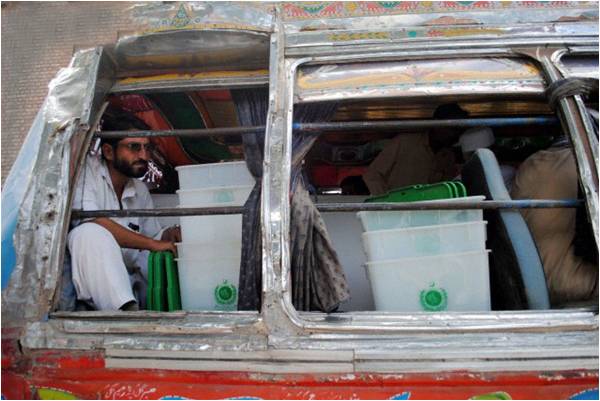
Nine months after the local elections in the Khyber Pakhtunkhwa province – which fulfilled Imran Khan’s election promise of devolution of power – local representatives say they have no money and no powers.
When it formed a government in the province in 2013, Pakistan Tehrik-e-Insaf (PTI) had said it would hold local elections within three months. The polls were carried out in 3,501 villages and neighborhoods on May 30, 2015.
“Local body elections will devolve power to the grassroots level,” PTI chairman Imran Khan had told a rally in Mardan, days before the election. “The system will no longer be in the hands of ministers and members of the provincial assembly.”
But councilors say the Khyber Pakhtunkhwa District Government Rules of Business, issued in December 2015, gave all the powers of the local government to the bureaucracy.
District and Tehsil Nazims have not received any salaries or privileges so far.
“The Rules of Business of 2015 have reversed the empowerment of local representatives in the Local Government Act of 2013,” says Muhammad Ali Shah, the district Nazim (or mayor) of Swat. “All the powers now rest with deputy commissioner of the district.”
“The deputy commissioner shall be the coordinating head of the secretariat to facilitate in day-to-day working of the district government,” says Section 8 of the 2015 law.
“The district Nazim is now a symbolic position with no political power,” says Muhammad Ali Shah, “not very different from the emperor of Japan.”
Abdur Rashid, the Naib Nazim (or deputy mayor) of Lower Dir, says he has not received a salary so far, and spends his own money to carry out his official duties. “Due to non-payment of salaries or honorariums, the councilors do not show up for district assembly meetings. We cannot expect them to spend their own money for too long.”
The new rules have reduced the powers of the deputy mayor, and the officials of the devolved departments do not listen to elected representatives, he says. Abdur Rashid, who is from Jamaat-e-Islami, is also critical of the procedure of the appointment of secretaries to the Nazims. “In many cases, the appointed secretaries have no significant computing skills,” he says. “How will they operate the system?”
With their administrative and financial powers taken away, the Nazim’s job has been limited to presenting Annual Development Programs, says Syed Ahmad Ali Shah, the district Nazim of Malakand.

The fiscal year will end in three months, he says, but the districts have not even been given their budgeted money. “How will we spent the funds in such a short time?” In Batkhela, the District Headquarters Hospital ran out of medicines six months ago.
The Nazim cannot even transfer the employees of the devolved departments, he complains.
Section 13 of Rules of Business states that the posting of deputy commissioners, heads of the devolved departments, and other officers of grade-17 and above will be regulated by the provincial government. The district nazims can transfer employees of paygrade 16 and below, as long as they are in line with other regulations.
Ahmad Ali Shah, who won on a PPP ticket, says the 2015 law has “empowered the bureaucracy, in line with a deliberate plan to destabilize the local government system”.
The reason, alleges an opposition activist, is that the PTI failed to win the local elections. Nazir Khan, a member of the Awami National Party (ANP) in Charsadda, said the provincial government did not want to share powers with the local representatives from rival political parties.
Sadiq Muhammad, a member of the opposition party JUI-F in Lower Dir, says the Khyber Pakhtunlhwa government did not want to hold local elections, until they were compelled by the Supreme Court to do so. “Now, the provincial government itself wants to render the system ineffective.”
The district Nazim of Tank, Mustafa Kundi, belongs to the PTI. He says he is satisfied with the system and is optimistic that it will succeed. “The system is running smoothly. We have no issues of funds. The Nazims exercise their power without any problems,” he said.
According to an official in the Chief Minister’s Secretariat in Peshawar, says the new law does not include a complete set of rules. “There is no formula for the provision of funds to the Nazims,” he says. “There is no salary or honorarium structure for the more than 43,000 elected local representatives.” A provincial ‘Inspection Team’ has concerns about the recruitment of secretaries for the Nazims. “There is a difference between the list made by the National Testing Center, and the actual appointments.” Money was also set aside for the posts of Naib Qasid in this year’s budget, but there was no hiring. The official asked not to be named because of the nature of his job.
“I acknowledge that salaries, perks and privileges are a major issue,” says Inayatullah Khan, a senior provincial minister for Local Government, Elections and Rural Development. “We have set up a committee chaired by the Finance Secretary, and the issue will be resolved in days,” he told me.
Inayatullah Khan said the local government’s funds are non-lapsable, but they will used up before June in any case.
On February 18, newspapers reported that a group of local representatives in Khyber Pakhtunkhwa had ended a three-day protest outside the provincial assembly after the minister told them their grievances would be addressed in 20 days.
Tahir Ali is an Islamabad-based journalist
Twitter: @tahirafghan
When it formed a government in the province in 2013, Pakistan Tehrik-e-Insaf (PTI) had said it would hold local elections within three months. The polls were carried out in 3,501 villages and neighborhoods on May 30, 2015.
“Local body elections will devolve power to the grassroots level,” PTI chairman Imran Khan had told a rally in Mardan, days before the election. “The system will no longer be in the hands of ministers and members of the provincial assembly.”
But councilors say the Khyber Pakhtunkhwa District Government Rules of Business, issued in December 2015, gave all the powers of the local government to the bureaucracy.
District and Tehsil Nazims have not received any salaries or privileges so far.
“The Rules of Business of 2015 have reversed the empowerment of local representatives in the Local Government Act of 2013,” says Muhammad Ali Shah, the district Nazim (or mayor) of Swat. “All the powers now rest with deputy commissioner of the district.”
"The district Nazim is like the emperor of Japan"
“The deputy commissioner shall be the coordinating head of the secretariat to facilitate in day-to-day working of the district government,” says Section 8 of the 2015 law.
“The district Nazim is now a symbolic position with no political power,” says Muhammad Ali Shah, “not very different from the emperor of Japan.”
Abdur Rashid, the Naib Nazim (or deputy mayor) of Lower Dir, says he has not received a salary so far, and spends his own money to carry out his official duties. “Due to non-payment of salaries or honorariums, the councilors do not show up for district assembly meetings. We cannot expect them to spend their own money for too long.”
The new rules have reduced the powers of the deputy mayor, and the officials of the devolved departments do not listen to elected representatives, he says. Abdur Rashid, who is from Jamaat-e-Islami, is also critical of the procedure of the appointment of secretaries to the Nazims. “In many cases, the appointed secretaries have no significant computing skills,” he says. “How will they operate the system?”
With their administrative and financial powers taken away, the Nazim’s job has been limited to presenting Annual Development Programs, says Syed Ahmad Ali Shah, the district Nazim of Malakand.

The fiscal year will end in three months, he says, but the districts have not even been given their budgeted money. “How will we spent the funds in such a short time?” In Batkhela, the District Headquarters Hospital ran out of medicines six months ago.
The Nazim cannot even transfer the employees of the devolved departments, he complains.
Section 13 of Rules of Business states that the posting of deputy commissioners, heads of the devolved departments, and other officers of grade-17 and above will be regulated by the provincial government. The district nazims can transfer employees of paygrade 16 and below, as long as they are in line with other regulations.
Ahmad Ali Shah, who won on a PPP ticket, says the 2015 law has “empowered the bureaucracy, in line with a deliberate plan to destabilize the local government system”.
The reason, alleges an opposition activist, is that the PTI failed to win the local elections. Nazir Khan, a member of the Awami National Party (ANP) in Charsadda, said the provincial government did not want to share powers with the local representatives from rival political parties.
Sadiq Muhammad, a member of the opposition party JUI-F in Lower Dir, says the Khyber Pakhtunlhwa government did not want to hold local elections, until they were compelled by the Supreme Court to do so. “Now, the provincial government itself wants to render the system ineffective.”
The district Nazim of Tank, Mustafa Kundi, belongs to the PTI. He says he is satisfied with the system and is optimistic that it will succeed. “The system is running smoothly. We have no issues of funds. The Nazims exercise their power without any problems,” he said.
According to an official in the Chief Minister’s Secretariat in Peshawar, says the new law does not include a complete set of rules. “There is no formula for the provision of funds to the Nazims,” he says. “There is no salary or honorarium structure for the more than 43,000 elected local representatives.” A provincial ‘Inspection Team’ has concerns about the recruitment of secretaries for the Nazims. “There is a difference between the list made by the National Testing Center, and the actual appointments.” Money was also set aside for the posts of Naib Qasid in this year’s budget, but there was no hiring. The official asked not to be named because of the nature of his job.
“I acknowledge that salaries, perks and privileges are a major issue,” says Inayatullah Khan, a senior provincial minister for Local Government, Elections and Rural Development. “We have set up a committee chaired by the Finance Secretary, and the issue will be resolved in days,” he told me.
Inayatullah Khan said the local government’s funds are non-lapsable, but they will used up before June in any case.
On February 18, newspapers reported that a group of local representatives in Khyber Pakhtunkhwa had ended a three-day protest outside the provincial assembly after the minister told them their grievances would be addressed in 20 days.
Tahir Ali is an Islamabad-based journalist
Twitter: @tahirafghan

